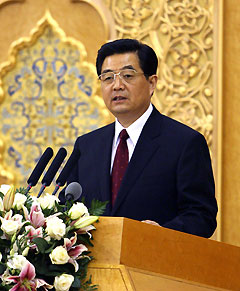Top News
China ready to help in peace efforts
(China Daily)
Updated: 2006-04-24 05:22
 |
Large Medium Small |
China is ready to help bring about peace and stability in the Middle East, visiting President Hu Jintao said yesterday.
In an address to Saudi Arabia's Shura consultative council an advisory body in the capital Riyadh, Hu said world peace and prosperity are not possible without stability and development in Middle East, a region of great global significance.
 |
|
| President Hu Jintao addresses at the Saudi Arabia's Shura consultative council. [Xinhua] |
After the Cold War, the Middle East region has generally been heading along a path of peace and stability, but still faces various challenges, the president said.
All these have prevented the region from fully tapping its potential for development, Hu said.
Following his visit to the United States, Hu arrived in Riyadh on Saturday for his first three-day state visit to Saudi Arabia at the invitation of Saudi King Abdullah bin Abdul-Aziz.
Bilateral agreements on trade, security and health were signed on the same day in the presence of the two leaders.
Details of the deals were not made public, but analysts said Hu's trip would add further impetus to burgeoning bilateral relations.
During talks with King Abdullah, Hu said his visit was aimed at furthering strategic co-operation in various fields.
He proposed to strengthen energy co-operation, expand oil trade and explore collaboration in oil storage facilities, refining, petrochemicals and sales.
Hu said he hoped enterprises of the two countries can increase investment and partnership.
"China will make joint efforts with Saudi Arabia to speed up the negotiation process on a free trade agreement between China and the Gulf Co-operation Council (GCC)," he said.
The GCC, established in 1981, consists of six Arab countries: Oman, Bahrain, Kuwait, Qatar, Saudi Arabia and the United Arab Emirates.
Hu's trip to Saudi Arabia came three months after Abdullah's visit to China on his first overseas trip as king. It was the first by a Saudi monarch since the country established diplomatic relations with China in 1990.
Saudi Arabia is China's biggest trade partner in West Asia and North Africa with bilateral trade volume reaching US$16 billion last year, up 56 per cent compared with the previous year.
Responding to his Chinese guest, King Abdullah said Saudi Arabia hopes to cultivate a sincere friendship and have all-round co-operation with China.
He voiced appreciation for China's constructive role in promoting peace in the Middle East, hoping that China pays more attention to the region and continue to play a positive role in resolving such issues.
Hu also met GCC Secretary-General Abdul-Rahman Al-Attiyah, who said the bloc encourages its member states to promote relations with China.
He said that the GCC appreciates China's active participation in free trade negotiations and hopes to reach an agreement as soon as possible.
Hu also visited the headquarters of industrial giant Saudi Basic Industries Corporation (SABIC), where he discussed a US$5.3-billion petrochemical project in China in which the Saudis are interested in investing.
SABIC's Vice-Chairman Mohamed al-Mady said his company would "reinforce our presence in China by establishing mega industrial projects."
"The Chinese market is a key strategic global petrochemical market from SABIC's point of view," he added.
SABIC's annual US$2 billion in exports to China include fertilizers, synthetic fabrics, iron, steel and plastic products.
Hu is scheduled to arrive in Morocco today for a two-day state visit. He will also visit Nigeria and Kenya.
(China Daily 04/24/2006 page1)